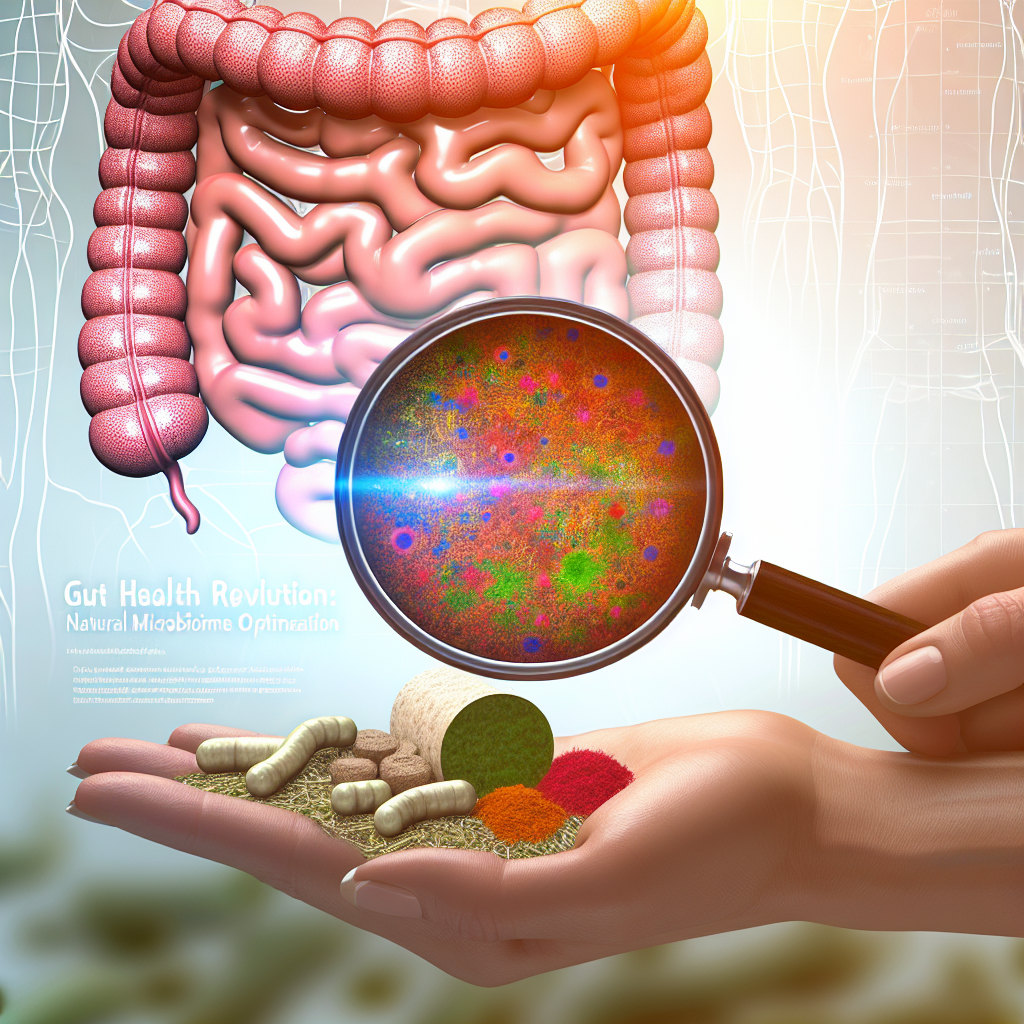Gut Health Revolution: Natural Microbiome Optimization
Introduction: Unlocking the Power of a Healthy Gut
In recent years, scientific research has unveiled the critical role that gut health plays in overall well-being. From digestion and metabolism to immune function and mental health, the gut microbiome—a vast community of trillions of bacteria, fungi, and viruses residing in the digestive system—has been identified as a key player in maintaining bodily harmony. The emerging field of microbiome science suggests that optimizing gut health naturally can have profound benefits, influencing everything from mood to chronic disease prevention.
The gut microbiome is an ecosystem that works symbiotically with the human body. When in balance, these microbes support digestion, aid in nutrient absorption, and even help combat harmful pathogens. However, when disrupted due to poor diet, high stress, antibiotic overuse, or environmental toxins, this imbalance—known as dysbiosis—can lead to gastrointestinal issues, autoimmune disorders, obesity, and mental health conditions such as anxiety and depression. This realization has sparked a revolution in natural treatments aimed at restoring microbiome balance without reliance on pharmaceuticals.
Homeopathic and herbal treatments have gained considerable attention for their potential to enhance gut health naturally. Historically, traditional medicine systems like Ayurvedic and Traditional Chinese Medicine (TCM) have utilized herbs, probiotics, and fermented foods for gut healing. Today, modern science is catching up, validating ancient wisdom through research on the benefits of prebiotics, probiotics, and herbal remedies.
In this article, we will explore the cutting-edge research on natural microbiome optimization and investigate how homeopathic and herbal treatments can support a thriving gut ecosystem. Whether you are dealing with digestive discomfort, chronic gut conditions, or simply looking to enhance overall vitality, understanding the power of natural interventions can equip you with the tools to restore and maintain optimal gut health. Join the gut health revolution and discover how nature’s solutions can transform your well-being from the inside out.
Medical Studies and Research: The Science Behind Gut Microbiome Optimization
Scientific interest in the gut microbiome has grown significantly in the past two decades. Numerous studies highlight how the gut’s microbial composition affects digestion, immunity, metabolism, and even mental health.
The Gut-Brain Axis: How the Microbiome Affects Mental Health
One of the most compelling areas of research is the connection between the gut and the brain, commonly referred to as the gut-brain axis. A study published in Nature Microbiology (Cryan et al., 2019) explored how gut bacteria influence neurotransmitter production, affecting mood, cognition, and stress response. The research suggests that probiotics and fermented foods, such as kimchi and yogurt, play a role in reducing symptoms of anxiety and depression by modulating gut microbial composition (source).
Probiotics: The Benefits of Healthy Bacteria for Gut Balance
Probiotics are beneficial bacteria that help restore gut balance. A 2020 study in The American Journal of Clinical Nutrition analyzed the effects of Lactobacillus and Bifidobacterium strains in improving digestive health and reducing inflammation. The study concluded that consistent probiotic intake reduced symptoms of irritable bowel syndrome (IBS) and inflammatory bowel disease (IBD), providing a compelling case for natural gut health interventions (source).
Prebiotics: Feeding Your Gut with the Right Nutrients
In addition to probiotic supplementation, prebiotics—non-digestible fibers that nourish gut bacteria—have been extensively studied for their role in improving gut health. Research published in The Journal of Nutrition (Gibson et al., 2017) demonstrated that prebiotic-rich foods like garlic, onions, bananas, and asparagus promote the growth of beneficial gut microbes such as Bifidobacteria and Akkermansia. These microbes are essential for producing short-chain fatty acids (SCFAs), which improve gut barrier function and reduce inflammation (source).
Herbal Remedies: Time-Tested Solutions Backed by Science
Herbal remedies are also gaining scientific validation for their role in digestive health. Research conducted at the University of Maryland Medical Center highlights the efficacy of herbal treatments like slippery elm, ginger, and licorice root in soothing digestive discomfort and reducing gut inflammation. These natural remedies work by promoting mucus production in the gut lining, offering protection against irritation and ulcer formation (source).
Polyphenols: Antioxidant-Rich Foods That Support Gut Diversity
Recent studies have also explored the impact of polyphenol-rich foods—such as green tea, berries, and dark chocolate—on gut microbiome diversity. A 2021 study in Frontiers in Nutrition found that polyphenols help modulate gut bacteria composition, increasing beneficial strains that protect against chronic diseases and oxidative stress (source).
The findings from these studies reinforce the importance of adopting natural, science-backed strategies to optimize gut health. Through probiotics, prebiotics, herbal remedies, and polyphenols, individuals can harness the power of nature to restore microbial balance and enhance overall well-being.
Conclusion: Embrace the Gut Health Revolution
The gut health revolution is transforming the way we approach digestion, immunity, and overall health. Scientific research continues to uncover the immense influence of the microbiome on human physiology, making it clear that a balanced gut is crucial for optimal well-being. While modern medicine often relies on antibiotics and pharmaceuticals to manage gut disorders, natural interventions provide an effective, sustainable approach to microbiome optimization.
Incorporating probiotics, prebiotics, and herbal remedies into daily routines can help restore microbial balance and support digestion, immunity, and mental health. Scientific studies have confirmed that gut-friendly foods like fermented vegetables, fiber-rich plants, and polyphenol-packed greens contribute to a robust microbiome. By reducing inflammation and fostering beneficial bacteria, these natural solutions can transform gut health from within.
Embracing the power of nature in maintaining gut balance not only enhances digestion but also contributes to long-term health and vitality. Whether through adding probiotic-rich foods, consuming prebiotic fibers, or utilizing time-tested herbal medicines, optimizing gut health naturally is within reach. As research continues to evolve, it is becoming increasingly evident that the path to holistic wellness begins in the gut.
Summary:
The gut health revolution is transforming the way we approach overall well-being, with scientific research unveiling the critical role of the gut microbiome. By adopting natural interventions like probiotics, prebiotics, and herbal remedies, individuals can restore microbial balance and support digestion, immunity, and mental health. Embracing the power of nature to optimize gut health is a sustainable path to holistic wellness.
References:
– Cryan, J. F., et al. (2019). “The microbiota-gut-brain axis.” Nature Microbiology. source
– Gibson, G. R., et al. (2017). “Dietary prebiotics and their impact on the gut microbiota.” The Journal of Nutrition. source
– The American Journal of Clinical Nutrition. (2020). “Effects of probiotics on gut health.” source
– University of Maryland Medical Center. “Herbal remedies for gut health.” source
– Frontiers in Nutrition. (2021). “Polyphenols and gut microbiota.” source

Dominic E. is a passionate filmmaker navigating the exciting intersection of art and science. By day, he delves into the complexities of the human body as a full-time medical writer, meticulously translating intricate medical concepts into accessible and engaging narratives. By night, he explores the boundless realm of cinematic storytelling, crafting narratives that evoke emotion and challenge perspectives.
Film Student and Full-time Medical Writer for ContentVendor.com




